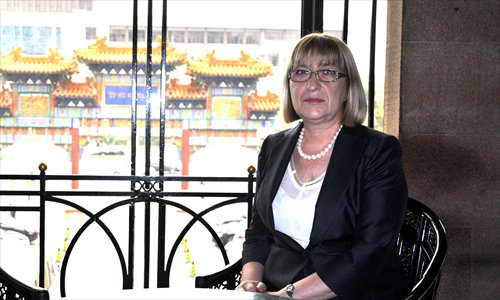President of Bulgaria’s National Assembly talks about bilateral relations

Tsetska Tsacheva, the president of the National Assembly of Bulgaria Photo: Yin Yeping/GT
China and Bulgaria have developed a strong relationship for decades. Bulgaria was the second country that established diplomatic relations with China, and the two sides are now looking forward to deepening the bilateral ties.
From June 26 to July 1, Tsetska Tsacheva, the president of Bulgaria's National Assembly, paid her first visit to China. During her visit, she met with Zhang Dejiang, the chairman of the Standing Committee of the National People's Congress, and Yu Zhengsheng, the chairman of the National Committee of the Chinese People's Political Consultative Conference. Tsacheva made a speech at Beijing Foreign Studies University, and visited Huawei Beijing Research Institute. A tour to the Great Wall, the Palace Museum and the Silk Market were also included in her visit. During her visit, she shared with Global Times (GT) her perspective for the bilateral relations.
GT: What's your initiative for this trip to China?
Tsacheva: Bulgaria and China have a good relationship and there is no unresolved issues between us. My initiative of this trip is to consolidate the bilateral trust and strengthen our cooperation in fields such as economy, education, culture, science and innovation. I believe that Bulgaria, as an EU member state, and China, as an important state in the world political and economic arena, will find sound and practical cooperative terms in the future. Our main focus of development is to attract more Chinese investors to Bulgaria, to expand the Bulgarian export to China, and to boost the bilateral tourism industry.
GT: How do you consider your role in deepening the relations between China and Bulgaria?
Tsacheva: In recent years, there have been active contacts between the presidents of the two countries. In 2014, Bulgarian President Rosen Plevneliev visited China and the bilateral relations were raised to a comprehensive friendly partnership. In 2015, the Bulgarian Prime Minister Boyko Borissov also visited China. During that time, he attended the Summit of China and Central and Eastern European Countries (16+1 Summit), and a number of agreements were signed. As the President of the National Assembly of Bulgaria, my focus is more about the interaction between the parliaments of both sides. In the past three years, we have welcomed over 30 Chinese parliamentarians to Bulgaria.
GT: How much do Bulgarian people know about China?
Tsacheva: The Bulgarian people are very interested in Chinese history and culture, as well as China's rapid economic development and modernization. More and more Bulgarian middle school and university students are interested in learning Chinese language. In 2014, a Bulgarian student named Tsvetelina Nedyalkova won first place in Chinese Bridge (a contest organized by the Confucius Institute in European countries to inspire foreign students to learn Chinese language and culture). Also, Bulgaria's Sofia University became the first rotating coordination center on the European side for China-CEEC (Central and East European Countries) Higher Education Institutes Consortium. The university also supports the involvement in promoting China-CEEC educational exchanges and cooperation. When we talk about China, we also think about Confucius. The Confucius Institute in Bulgaria plays an important role in boosting the bilateral relations.
GT: What do you want the Chinese people to know about Bulgaria?
Tsacheva: We are known for Bulgarian yoghurt, roses and wine. We also have rich tourism resources that include beautiful natural sceneries and abundant hot springs. Bulgaria is also a country with ancient history. The world's oldest gold coins dating back 2,750 years ago were discovered near Bulgaria's Black Sea coast.
Bulgaria offers good investment opportunities for foreign investors by providing them a stable investment environment; low taxes and a series of supportive policies. We would like to cooperate with China in an all-around way, especially in sectors such as infrastructure, transport (including highway and railroad), energy (including nuclear energy), and agriculture.
GT: How much will Brexit affect the trade and investment in Bulgaria for Chinese investors?
Tsacheva: I think it will cause some turbulence in the UK and now we can see that there are different voices within the country. London, Manchester, Liverpool, Scotland and Wales all voted to stay in the EU, whilst others did not. There is some instability in the UK, which is surely a challenge for the EU. We believe that the EU has the capability and strategy to overcome the difficulties. It is hard to predict how much it may influence Bulgaria and the EU, but I can assure you that it will not affect the Chinese companies there.